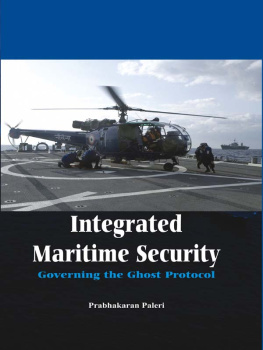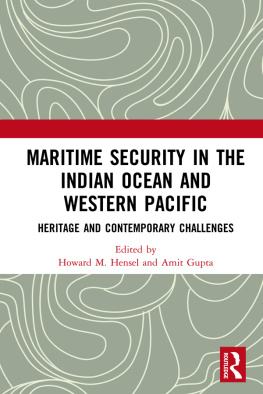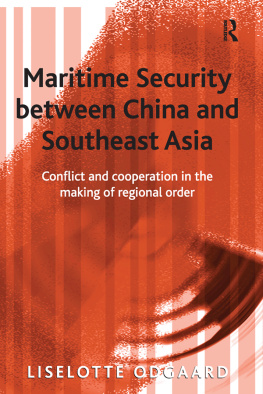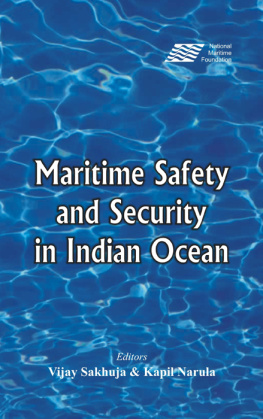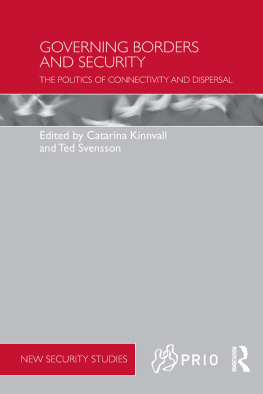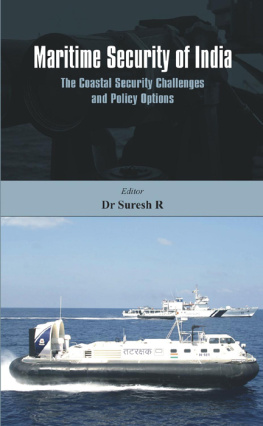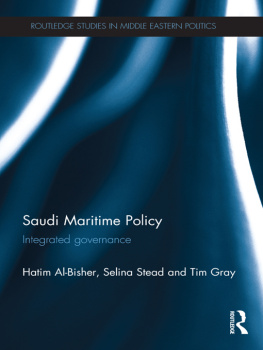Published by
Vij Books India Pvt Ltd
(Publishers, Distributors & Importers)
2/19, Ansari Road
Delhi - 110 002
Phones: 91-11-43596460, 91-11-47340674
Fax: 91-11-47340674
e-mail:
Copyright 2014, United Service Institution of India, New Delhi
ISBN: 978-9-382-65267-0
Price in India: Rs 1495/-
All rights reserved.
No part of this book may be reproduced, stored in a retrieval system, transmitted or utilized in any form or by any means, electronic, mechanical, photocopying, recording or otherwise, without the prior permission of the copyright owner. Application for such permission should be addressed to the publisher.
The views expressed in the book are of the author and not necessarily those of the USI or publishers.
Preface
The title of this book is a macro level statement. This is a composite and continuing work examining the land centred national security governance and its relation with the ocean. People have taken the ocean as a realm of mystery and perils since the very beginning. There were many catchphrases and statements of the he-who-rules-the-ocean-will-rule-the-world kind about the ocean and ocean governance. They were seemingly true according to the respective periods. That is, provided anybody could rule the ocean. It was the ocean that always ruled the world. It is next to impossible for any geopolitical entity to rule the ocean especially in modern times. Every geopolitical entity can exercise its right over it. Hegemonic ambitions and colonialism over the sea have become things of the past. An entity will have to tame the ocean appropriate to its rights. Taming the ocean for relative benefits is what the governments can attempt. The theme of this book revolves around ittaming the ocean. It is (more than) the chronicle of sagar manthan1 and the symbolism concealed in it, yet in another form. It is new; it is different as a concept. It is also difficult to implement right away unless the government is daring to break the method inertia of governance associated with it. For these reasons the idea may not find immediate acceptance. But the findings, it is expected, may carve a niche in strategic appreciation not only in national governance but also in governing any human system where wellbeing, not the doled out welfare or selective political anointment, is the end objective. It is expected to pick up in the natural way as the art and science of national governance evolves.
The examination of the concept of national security clearly indicates that the idea is practised in a fragmented manner all over the world taking the physical security of a nation as the prime requirement for any government to meet in national governance. It becomes the leading objective and reinforces the view that national security means the physical security of a nation against external and internal threats. This is far from truth. Since the late 18th century scholars have identified national security as a much broader concept, but in a world troubled by war, violence and crime, the governance got focused on survival against physical threats. The concept of national security lap dissolved in military affairs and internal problems of security in the name of national security. The practice is continuing.
This book examines the evolution of the wholesome concept of national security and its definition, and showcases governance aimed at maximising national security through the identified interactive elements of it. Governance of human system is naturally land centred and thereby the terrain specific national security external to land gets isolated, though may receive selective attention of governments. This is largely visible in governing the ocean. The governments can overcome this situation and the ocean can be governed more effectively by integrating maritime security with national security. The study confirms it.
Like any other task, national governance too gravitates through familiar and beaten tracks in any political system. Altering the course of governance has to be done carefully and slowly. It is like wheeling over a fully laden ultra large crude carrying tanker in restricted water, though there is room to manoeuvre. There is massive inertia, hence no quick remedy in governance. Altering course of governance takes time.
The idea of integrated maritime security originated from my professional experience, previous research studies, and discussions and interactions with various veterans and scholars on the subject. Standing atop the bridge of a ship in absolute command watching the restlessly manic and endless sea, one gets into an orgasmic spin of superhuman spirit with the awareness of unlimited accountability towards the safety of the ship and the lives on board. It would have happened to many commanders and masters who were fortunate to encounter the perils of the sea very early in life. Yes, fortunate. It is an experience that defies explanation. The spin continues for the rest of ones life even after finishing with main engines.
Whether the situation is close quarter or open quarter, one has to love the sea to feel the dread of it before taming it.
Every researcher and practitioner will have his or her own perspectives. This study carries my perspective of the ocean and the concept of national security, not maritime security, as an exclusive idea in isolation. For this, I respect the research findings of many scholars on the subject. Their findings not only enlightened me but also encouraged me to delve deeper. I practiced it at every turn of my career. The idea of this book is to present the findings and suggestions to the executors and researchers for application and further research. Being a new concept, the ideas may find reiterated in various chapters in different forms for familiarity and reinforcement while reading through.
The study is not specific to any country. But there are references to many countries for driving the point home. The study takes into consideration every geopolitical entity, each one different from the other and governed differently. The idea suggested here is national governance with the sole objective of maximisation of national security, as the way it is defined here, by integrating the terrain specific maritime security for better yield from the ocean. To that extent integrated maritime security is the absolute assimilation of the terrain specific aspects of the ocean related to a geopolitical entity with its national security elements for maximising the benefits to the people by governance.
The book is global in scope. It is about bringing the ocean over land for governing it. The findings are applicable to any entity, including the landlocked and geographically disadvantaged, provided it can understand and appreciate its part of the ocean. It will be useful even to prevent the damages when the ocean comes over to lunch uninvited if and when the sea level rises. When it happens, the low lying nations do not actually sink or drown; they get choked by the ocean riding them commandingly. This is what a tsunami does, though temporarily. Sea level rise is much worse.
This book goes along with the design of my previous research on national security, a concept I believed was much larger than the idea of national security that has been practiced all around the world. It was a revelation. Building further on the research, one reaches a state of sanguine confidence that the world doesnt have to struggle so much to achieve wellbeing or do all that to safeguard whatever it wants to safeguard. An alteration of course, perhaps, is all what is necessary which anyway will happen when the decks are open. This book may throw some wild cards when it happens.


